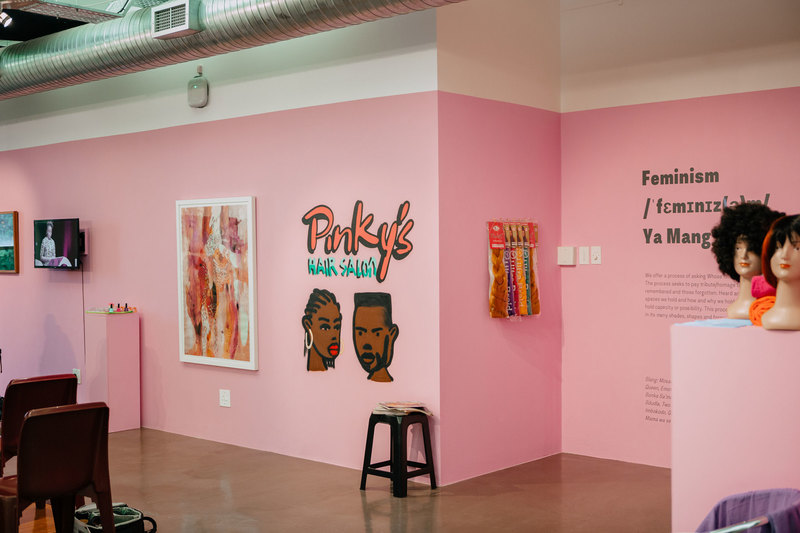Centre for African Studies Gallery hosts African-inspired feminism exhibition
10 May 2022 | Story Niémah Davids. Photos Robyn Walker. Read time 6 min.
Feminism ya Mang, Feminism Yethu, Feminish Yani (FYM) – a multiplicity of experiences and expressions of womanhood, sexuality and feminism woven together – underpin the latest touring art exhibition on display at the University of Cape Town’s (UCT) Centre for African Studies (CAS) Gallery.
A selection of images, artwork and installations by several artists makes up this latest exhibition – the first public display facilitated by UCT’s Works of Art Collection (WOAC) committee since the start of the COVID-19 pandemic.
Conceptualised by UCT alumna Masechaba Moloi and Samantha Modisenyane, FYM first opened at the Goethe-Institut in Johannesburg and formed part of the South African iteration of Learning Feminisms. Following the Johannesburg showing, the exhibition travelled to the Polokwane Art Museum and will make its way to the North-West University after its stint at UCT.
“The exhibition is a reflection of the diversity of experiences and expressions in being [a]woman in spaces such as those represented in the exhibition images, artworks and installations.”
“The exhibition is a reflection of the diversity of experiences and expressions in being [a] woman in spaces such as those represented in the exhibition images, artworks and installations,” Moloi said. “Notions of gender or queerness are not static and are constantly being challenged by a myriad of lived experiences. By engaging with this complexity, the exhibition aims to celebrate the diversity of knowledge that contributes to our regional experiences of feminism.”
The official launch took place at the CAS Gallery on Friday, 6 May, and comprised an impressive event line-up, including a panel discussion on feminism, a weekend walkabout and night of “ballroom fierceness” at Cape Town club Ghost.
The background
Moloi said the exhibition seeks to better understand feminist theories and women’s movements in the broader global social movement context. It also aims to answer a list of question such as: how women-led political organisations and socio-economic strategies are structured; whether African men practise feminism and if so, when and how; what type of changes can be observed in the various waves of African feminism and how they relate to western feminism; and the relationship between western feminism, African feminism and other southern feminisms.
“It remains important that we are aware of the sensitivities around the topic and approach the topic and the process with the understanding that we are not the first or the last to have these conversations,” she said.
The official launch of the “Feminism ya Mang, Feminism Yethu, Feminish Yani” exhibition took place at the CAS Gallery on Friday, 6 May, and comprised an impressive event line-up, including a panel discussion on feminism.
On what makes the work unique, Moloi said it aims to pay homage to women everywhere – seen or unseen, those remembered and those forgotten, as well as those heard and unheard. In addition, it also seeks to explore the definition of various roles that women occupy in South Africa – from mother, sister, daughter and friend, to shebeen and local salon owner.
“It’s a process of looking at the spaces we hold and how and why we hold these spaces, along with which spaces hold capacity or possibility. This process is an offering; a celebration of our existence in its many shades, shapes and forms: spiritually, physically, mentally and emotionally,” she said.
What feminism means
During the panel discussion, participants shared their varied views on feminism. Contributors included Moloi, Modisenyane and several artists whose work make up this exhibition. The conversation centred around how participants define feminism, why it’s called African feminism and what those theories are based on.
When artist Jabu Newman thinks of the meaning of feminism, her grandmother always comes to mind. She said the woman demonstrated true strength when she registered for a university degree over the age of 40 years old and was committed to attaining her qualification. Similarly, fellow artist Kelly Johnson said her grandmother’s determination to remain in her home despite being forcibly removed to a community in the Cape Flats during apartheid has always been her definition of true feminism.
And for Amy Lester, her late mother always characterised true feminism. Even while battling cancer for more than two decades, she said she remained feisty and in control of her life – running a household from her bed and organising her Tupperware cupboards even though she often struggled to get down the passage to the kitchen.
“It [cancer] was not a battle for her. She was a giant,” Lester said.
An ‘inclusive’ space
As Moloi conceptualised this exhibition in partnership with Modisenyane, she said inclusivity was always top of mind, and not just in regard to art but representation as well. As a result, she said the FYM installation and design speaks to the memories artists share, from a shebeen queen and salon owner in the township, to the hawker selling tripe and sheep head on the side of the road.
“We wanted to make sure that we layered the space in a way that is accessible to all.”
“We wanted to make sure that we layered the space in a way that is accessible to all. Our aim is to re-examine these perspectives [through] an interactive, open and learning conversation, where lived experience, our performative selves and our engagements with the biological body form our starting points,” she said.
“This is not a project. It’s a process of understanding and celebrating – a reminder that our lives matter – as black, as women and as human.”
The CAS Gallery is open on Tuesdays, Thursdays and Fridays from 09:00 to 16:00 for public viewings of the exhibition until the end of term.
 This work is licensed under a Creative Commons Attribution-NoDerivatives 4.0 International License.
This work is licensed under a Creative Commons Attribution-NoDerivatives 4.0 International License.
Please view the republishing articles page for more information.



































